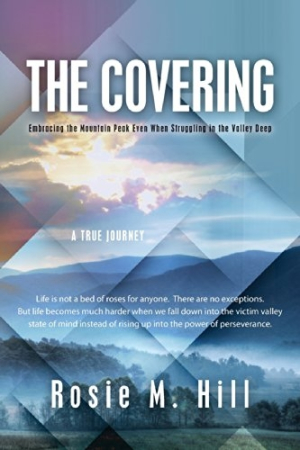The Covering
Hill writes with a clear intention to teach readers how to embrace a positive outlook against even abysmal circumstances.
Rosie M. Hill, author of The Covering, personifies perseverance. She writes honestly and objectively about some of the monstrous realities with which she is intimately acquainted: child abuse, poverty, ignorance, racism, and inequality—all of which she overcame.
As a young child, Hill struggled to reconcile the actions of adults around her, such as her alcoholic mother and oft-absent father, with the community she discovered in church. She also found refuge in the classroom, guided by a few teachers, including one who took notice of Hill’s bruises and reported her observations to social services, a call that created a nearly irreparable rift between Hill and her family.
Hill’s persistent desire to learn drew the sustained criticism from her family that she was “acting ‘white.’” Ironically, it wasn’t until she became pregnant as a teenager, a reality more familiar to her family, that she was accepted. Although she was forced to drop out of school due to the pregnancy, Hill remained steadfast in the pursuit of her education and eventual position in the medical field. How she ultimately succeeds after repeated setbacks is a remarkable story.
There is no sugarcoating of experiences or observations here. Hill’s frank reportage underscores her rejection of victimhood; she does not tread in what she refers to as “victim-valley.” Though she endured horrific, maddening, and even criminal transgressions, she later reflects on those experiences as a woman of tenacious and inspiring faith. She writes, “I know that what happened to me was not accidental—was not coincidental, but providential. I was born to tell the story.”
Hill bolsters her personal chronicle with excerpts from the King James Bible. The biblical verses and motivational epigraphs from authors both familiar and obscure only support Hill’s thesis, though she thankfully does not rely on them to convince the reader of the power of perseverance. Rather, she believably details her own setbacks and successes, marked by teenage pregnancies, failed relationships, educational aspirations, disappointments, and racial and gender-driven inequities in the medical profession. Her story and message are compellingly delivered in a patient and intelligent tone.
The Covering invites readers to refuse to identify as victims. Hill’s conversational writing style casts her as an approachable authority on her subject and serves to engage the audience in an intimate dialogue with a trusted friend. While personal letters from Hill’s children may seem like unnecessary testimony, their inclusion does provide additional insight into the author’s character, narrative, and conclusive claim: “In the aftermath of all the trials and tribulations, God clearly had a plan for me and for them. He allowed challenges in our lives; and we thrived.”
No matter the obstacles, Hill implores her readers to secure themselves beneath the canopy of faith in order to realize their dreams and destinies.
Reviewed by
Amanda Silva
Disclosure: This article is not an endorsement, but a review. The publisher of this book provided free copies of the book and paid a small fee to have their book reviewed by a professional reviewer. Foreword Reviews and Clarion Reviews make no guarantee that the publisher will receive a positive review. Foreword Magazine, Inc. is disclosing this in accordance with the Federal Trade Commission’s 16 CFR, Part 255.

